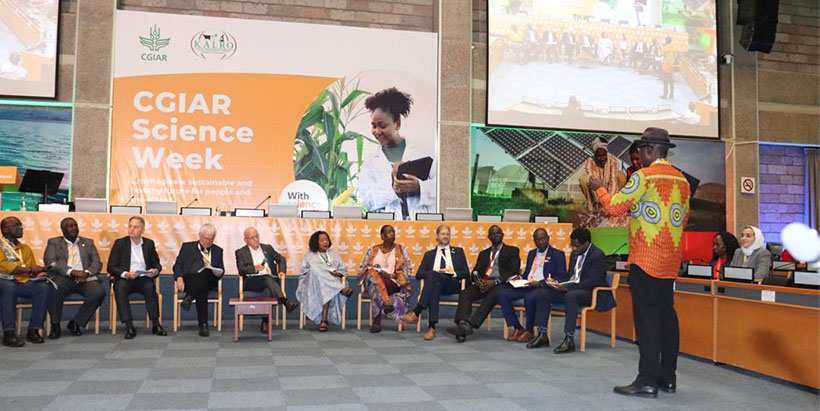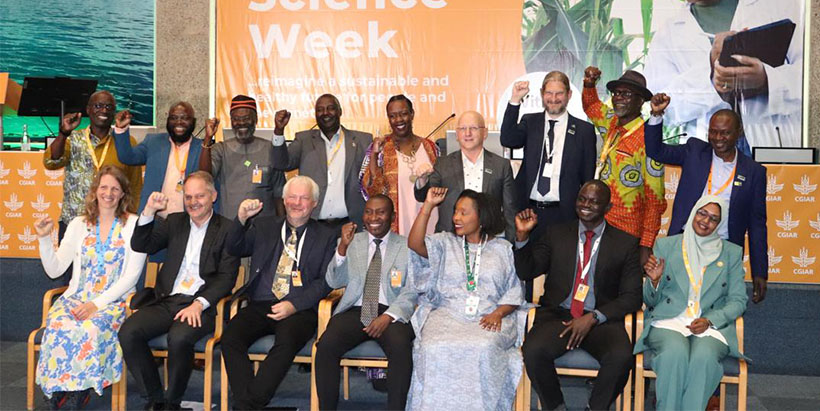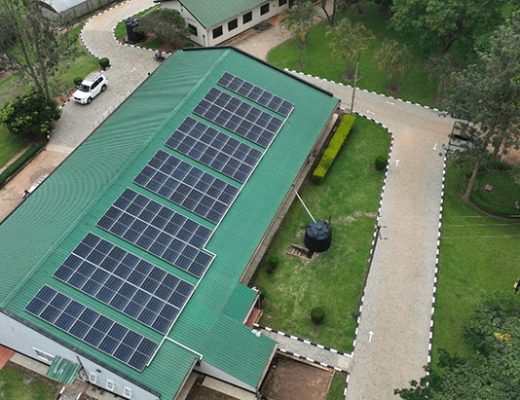
Dr Kwesi Attah-Krah moderating the panel session during the CAADP Side Event at the CGIAR Science Week in Nairobi, Kenya.
Following the Extraordinary Summit of the African Union (AU) held in Kampala, Uganda, early in the year, during which African leaders adopted the Kampala CAADP Declaration and endorsed the Comprehensive Africa Agriculture Development Programme (CAADP) Strategy and Action Plan 2026–2035.
On April 10, during the CGIAR Science Week in Nairobi, Kenya, leaders and experts convened at the Side Event themed; “A New Chapter for CAADP: The Kampala CAADP Declaration and CAADP Strategy and Action Plan, 2026-2035,” to reflect on these landmark decisions, and how CGIAR, working alongside its partners, can support the implementation of the new ten-year CAADP Strategy and Action Plan, including development of an African Common Position on Resilient and Sustainable Livestock Food Systems.
Discussions centered on how Africa can meet the AU’s ambitious target to increase agricultural output by 45% by 2035. The new CAADP Strategy and Action Plan emphasizes African leaders’ commitment to agricultural transformation, food security, and sustainable livelihoods, focusing on innovation, resilience, and inclusive growth.
Speaking on behalf of Dr Simeon Ehui, IITA Director General and CGIAR Regional Director for Africa, Dr Bernard Vanlauwe, IITA Deputy Director General for Research for Development, highlighted the significance of IITA’s role during his remarks.
“This gathering provides an opportunity to reflect on the progress made under the CAADP framework and to chart the course for the next decade of agricultural transformation in Africa. CGIAR is proud to be a partner in this journey. Through our research, policy engagement, and partnerships, we are committed to supporting CAADP’s goals by delivering science-driven solutions that enhance productivity, climate resilience, and economic opportunities for Africa’s smallholder farmers,” he said.
For IITA, the new CAADP Strategy and Declaration represents a vital opportunity to align research, innovation, and partnerships with continental priorities, ensuring greater impact through cutting-edge science, capacity strengthening, and policy engagement.
“IITA remains steadfast in its commitment to support African nations in achieving the ambitious targets set out in the Strategy,” added Dr Vanlauwe.
“As we move forward, let us work together to ensure that this new phase of CAADP delivers tangible and lasting impacts for Africa’s agricultural sector and food systems,” he said.
A new approach: From agriculture-led growth to agrifood systems transformation
The Kampala CAADP Declaration marks a critical evolution in Africa’s agricultural development strategy, shifting from an agriculture-led growth approach to a comprehensive agrifood systems transformation. Building on the achievements of the 2014 Malabo Declaration, the Kampala Declaration sets aspiring goals for 2035, including:
- Increase agrifood output by 45%;
- Triple intra-African trade in agrifood products and inputs;
- Reduce stunting, wasting, and obesity by 25%;
- Ensure 60% of the population can afford a healthy diet;
- Reduce extreme poverty by 50%.
To achieve these outcomes, the Strategy outlines six strategic objectives:
- Intensify sustainable food production, agro-industrialization, and trade;
- Boost investment and financing for agrifood system transformation;
- Ensure food and nutrition security;
- Advance inclusivity and equitable livelihoods;
- Build resilient agrifood systems;
- Strengthen governance of agrifood systems.
For the first time, the Declaration prominently highlights livestock food systems as crucial to achieving a vibrant agrifood system, setting the stage for an African Common Position on Resilient and Sustainable Livestock Food Systems.
A call to action for partners
The Kampala Declaration calls upon international organizations, including CGIAR, to:
- Align technical and financial support with the priorities outlined in the Strategy;
- Support the African Union Commission (AUC), AUDA-NEPAD, and Regional Economic Communities (RECs) in helping Member States integrate the Strategy into National and Regional Agrifood Systems Investment Plans (NASIPs/RASIPs);
- Strengthen data systems and mutual accountability frameworks at continental, regional, and national levels.
During the CAADP side event at Science Week, participants reviewed CAADP’s achievements and challenges, explored CGIAR’s contributions, and discussed mechanisms to support the Strategy’s implementation — including strengthening livestock food systems resilience.
CAADP: Two decades of progress and a new chapter
Since its inception in Maputo in 2003 and renewal through the Malabo Declaration in 2014, CAADP has been instrumental in promoting evidence-based decision-making and performance monitoring in African agriculture. Over the past two decades, the continent has made substantial progress — expanding public investment in agriculture, boosting intra-African agricultural trade, and improving poverty and nutrition outcomes.
However, challenges persist. The COVID-19 pandemic, climate change, conflicts, and trade disruptions such as the Russia-Ukraine war have slowed progress. Food security and economic growth have been impacted, highlighting the urgency for a more resilient, inclusive, and innovative agrifood system transformation.
The Side Event at the recent CGIAR Science Week, had key stakeholders from
International Livestock Research Institute (ILRI), International Water Management Institute (IWMI), African Forum for Agricultural Advisory Services (AFAAS), West and Central Africa Council for Agricultural Research and Development (CORAF), and Regional Universities Forum for Capacity Building in Agriculture, (RUFORUM) come together to propose actions, and commitments in the new Strategy and Declaration and its inclusivity, while exploring opportunities and mechanisms to engage in or support the implementation of the new Strategy and Declaration.
The new CAADP Strategy and Kampala Declaration provide a strong, renewed framework for African nations — with the support of IITA, CGIAR and other CGIAR centers, and other partners — to work collectively towards a thriving, food-secure, and prosperous continent.
Contributed by ’Timilehin Osunde



No Comments